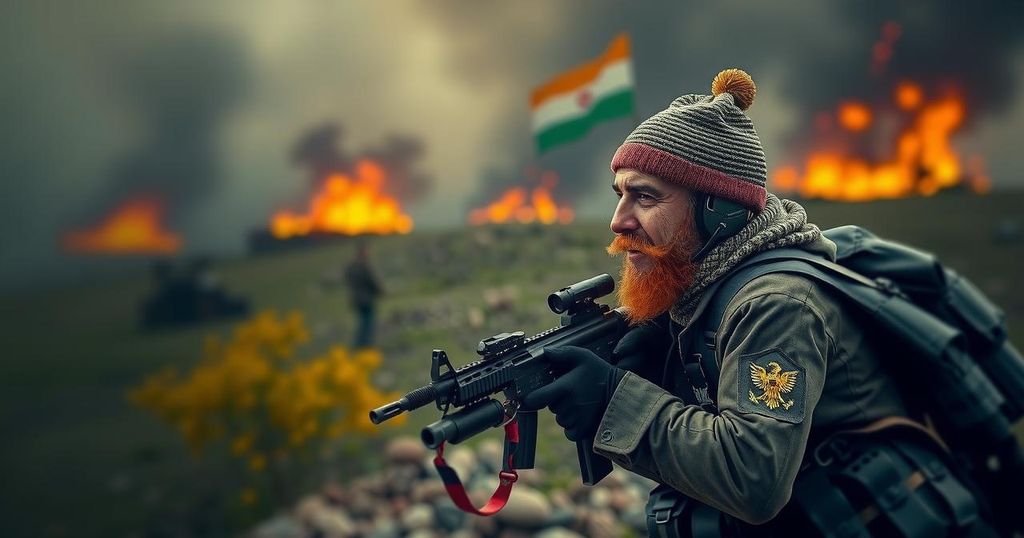Hezbollah is reportedly refraining from involvement in the renewed conflict in Syria, following substantial losses in its recent conflict with Israel. The group has withdrawn many fighters from Syria, focusing on domestic issues while maintaining a limited presence in border areas. Analysts highlight Hezbollah’s diminished capacity to engage further in Syria, as its attention shifts to the aftermath of the significant toll from its latest military engagements.
Recent reports indicate that Hezbollah will not engage in Syria’s ongoing conflict, particularly following a significant surprise offensive by rebel factions on November 27, which had resulted in the capture of regime-held territories. Having recently concluded a war with Israel, Hezbollah appears to have refocused its military efforts inward, withdrawing many of its forces from Syria. This shift suggests that the Lebanese group may take a more passive role regarding the escalating tensions in the northern region of Syria.
The Lebanese media have highlighted Hezbollah’s absence in the current conflict, stating that its fighters have been reassigned to manage the aftermath of the intense clashes with Israel. Although reports appear unclear on the number of Hezbollah fighters remaining in Syria, analysts believe that any presence is limited and strategically focused on border areas like al-Qusayr and Bloudan.
According to Rami Abdel Rahman of the Syrian Observatory for Human Rights, Hezbollah has not participated in the recent battles, reflecting the organization’s diminished influence in Syria. Riad Kahwaji from the Middle East and Gulf Military Analysis Center has emphasized that Hezbollah’s involvement in Syria is likely to stay reduced due to the complexities of the recent hostilities with Israel.
Political commentator Ali Al-Amin suggests that Hezbollah’s engagement in Syria would not hold significant advantages and could potentially tarnish the group’s reputation among its supporters, especially given the shifting dynamics surrounding the Assad regime. Moreover, mainstream Lebanese publications indicate that Hezbollah might now concentrate on domestic political challenges, having seemingly distanced itself from the broader ‘Axis of Resistance’ that includes Iran and associated militias.
Meanwhile, the aftermath of the recent conflict with Israel has inflicted a severe toll on Hezbollah. Preliminary assessments estimate that the group suffered between 3,500 to 4,000 fatalities, which starkly surpasses its losses from the 2006 conflict with Israel. Adding to the grim toll, many more members are unaccounted for, with specialized teams currently engaged in recovery efforts throughout various regions in Lebanon. The overall human cost is still under assessment, pending a comprehensive report from the organization itself. Hezbollah’s health official noted the broad impacts of this military engagement, affirming that the casualty figures among Hezbollah’s ranks remain uncertain, significantly overshadowing its previous losses in regional conflicts.
The context surrounding Hezbollah’s potential involvement in the Syrian conflict is shaped by its historical role in supporting the Assad regime since the onset of the civil war in 2011. However, recent developments have seen the organization reassess its commitments following a significant confrontation with Israel, which led to substantial military losses and necessitated a withdrawal of forces from Syria. The ongoing conflict in northern Syria has raised questions about Hezbollah’s capability and willingness to engage further abroad, especially under current strategic constraints.
In conclusion, Hezbollah’s anticipated non-participation in the renewed conflict in Syria reflects its ongoing recovery from recent losses sustained during the war with Israel. Analysts agree that the organization’s operational focus has shifted towards addressing immediate domestic pressures and understanding its role within a changing regional landscape. Given its substantial casualties and the need to reassess its military strategy, Hezbollah’s involvement in Syrian affairs seems unlikely in the foreseeable future.
Original Source: www.newarab.com






